President Dmitry Medvedev informed French President Nicolas Sarkozy by telephone Friday that Russia has decided to go ahead with a purchase of two French Mistral-class helicopter carriers, its biggest foreign arms purchase since the end of the Cold War.
The French reaction to the announcement was jubilant, with a banner on the Elysee's web site reading “France's naval industry has won!” — but the deal, worth up to $1.3 billion, has been greeted with apprehension by some smaller ex-Soviet states.
Lithuanian Defense Minister Rasa Jukneviciene on Monday criticized the decision to sell “extremely complex offensive weaponry to a third party, a country where the level of democracy is not one we can feel safe about,” she said, Reuters reported. “It's a big mistake.”
The Mistral-type amphibious assault ships can carry up to 16 helicopters, of which six can be on deck at any one time, and 450 troops for up to six months. For shorter periods that number rises to 700. The vessels also carry landing barges and hovercraft, allowing vehicles, tanks and soldiers to be quickly transferred ashore.
These capabilities will enhance Russia's control of its coastal regions and its striking power in conflicts like the war the Kremlin fought with Georgia in 2008.
The head of the General Staff, Nikolai Makarov, however, said the Pacific Fleet will receive the first Mistral-class ship. He mentioned its future importance in the defense of the Kuril Islands, whose ownership is disputed by Japan.
“Its presence is essential,” he said. “We need a mobile means whereby we can quickly deploy a landing party.”
The Mistral-class ships will be built by the French shipyard companies DCNS and STX in conjunction with Russia's state-run United Shipbuilding Corporation. It is estimated that each ship will cost up to $655 million.
Building will begin at France's Saint-Nazaire docks in 2011, with the first ship to be delivered at the end of 2013 and the second at the end of 2014.
United Shipbuilding's participation in the production of the first ship will amount to about 20 percent, spokesman Igor Ryabov said Friday. He added that “Russia's share in the construction will gradually increase,” Interfax reported. It is likely that two Mistral-class ships will subsequently be constructed in Russia, at docks in St. Petersburg.
Both sides win from the deal, said Ruslan Pukhov, director of the Center for Analysis of Strategies and Technologies, “but for the French it is a great, great victory.”
The French-led consortium fought off competition from Spanish, Dutch and South Korean firms after Moscow announced the international tender in October. A major attraction of the French bid was the fact that it was free from American components, licenses or technologies, Pukhov said.
Not only will it provide an “oxygen pillow” for French shipbuilding, said Pukhov, but it also “opens the door for big future purchases from France by the Russian Defense Ministry.”
A statement on the Elysee's web site said the deal would guarantee 1,000 French jobs for up to four years.
An important earlier sticking point of the deal had been technology transfer — with Russia insisting that the ships be fitted with state-of-the-art command and control technology.
Ryabov said Friday that Russian interests in this area had been satisfied. “United Shipbuilding Corporation has sacrificed profitability in this project for the sake of acquiring the technology to build this type of ship,” he said.
He confirmed that Russia would receive the technology to produce the Mistral's communication, command and control system.
The conclusion of the Mistral deal is the latest, and largest, in a series of foreign armament purchases by Moscow. It follows agreements to provide the Russian military with British sniper rifles, Israeli drones and Italian armored personnel carriers.
In an interview with the Izvestia newspaper on Monday, Defense Minister Anatoly Serdyukov admitted that Russia has “some need for foreign technology because, in certain areas of armament, we — unfortunately — lag behind. Our military equipment does not correspond to the demands of our age.”
He added that Russia doesn't have a history of manufacturing Mistral-type ships and that “to catch up now would be pointless.”
No country on the planet, however, produces all their military hardware internally, Pukhov said — even the United States buys some equipment from abroad.
“Russia used to pretend that it was an exception,” he added. “But now we're seeing that it has to follow the rules like everyone else.”
A Message from The Moscow Times:
Dear readers,
We are facing unprecedented challenges. Russia's Prosecutor General's Office has designated The Moscow Times as an "undesirable" organization, criminalizing our work and putting our staff at risk of prosecution. This follows our earlier unjust labeling as a "foreign agent."
These actions are direct attempts to silence independent journalism in Russia. The authorities claim our work "discredits the decisions of the Russian leadership." We see things differently: we strive to provide accurate, unbiased reporting on Russia.
We, the journalists of The Moscow Times, refuse to be silenced. But to continue our work, we need your help.
Your support, no matter how small, makes a world of difference. If you can, please support us monthly starting from just $2. It's quick to set up, and every contribution makes a significant impact.
By supporting The Moscow Times, you're defending open, independent journalism in the face of repression. Thank you for standing with us.
Remind me later.







